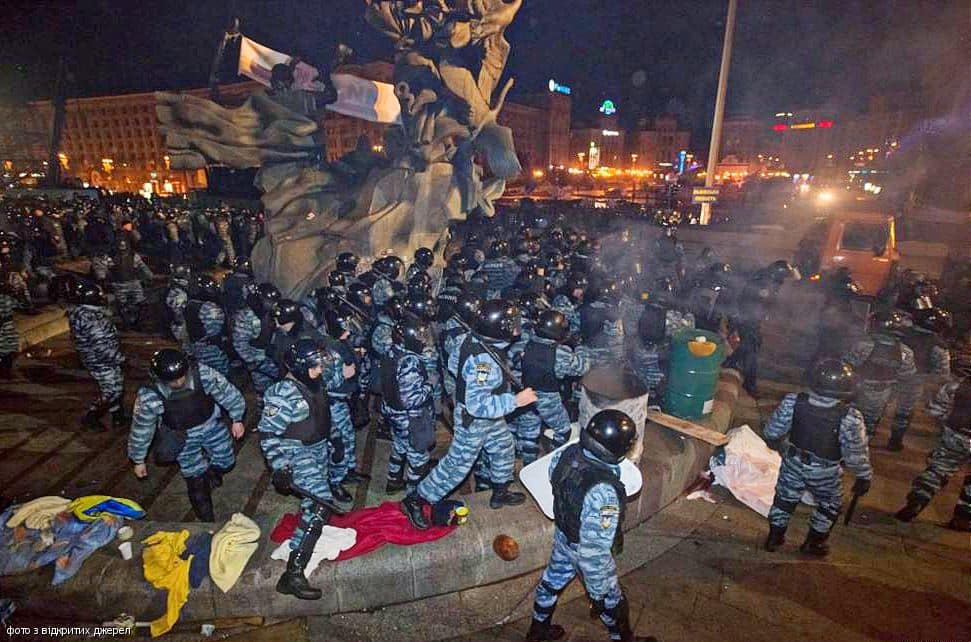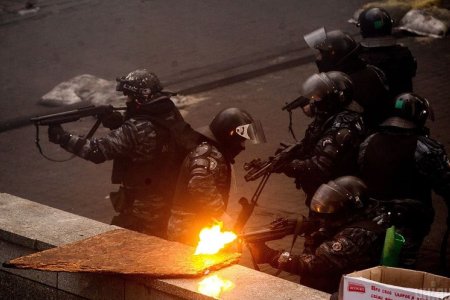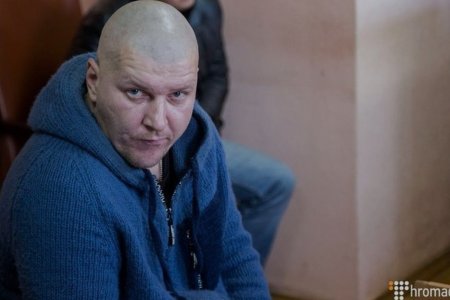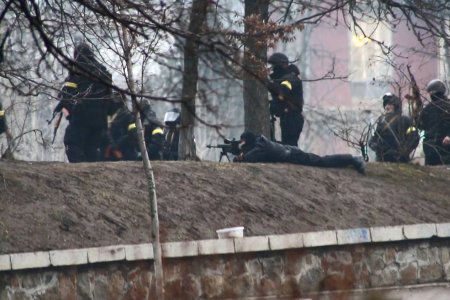
Two former Berkut officers have been sentenced to three years’ imprisonment over the violent dispersal of Maidan activists in the early morning of 30 November 2014. It was the savagery of that attack against young protesters, some of whom had been asleep, that outraged Ukrainians and brought a million onto the street in protest against the regime of former President Viktor Yanukovych and its repressive methods.
All criminal prosecutions over state attempts to violently crush the Euromaidan protests have taken a very long time, and this was no exception. The indictment against the two Berkut officers Vadym Shepel and Dmytro Dereviankin had been passed to the Shevchenkivsky District Court in Kyiv on 8 November 2018. It was almost exactly five years later, on 2 November 2023 that Judge Marina Antoniuk passed sentence. She found both men guilty of three charges, however only sentenced them in connection with one, as the other two were time-barred.
Shepel and Dereviankin were sentenced to three years’ imprisonment, and banned from holding any position in the law enforcement bodies for three years on the charge that, as part of an organized group, they had exceeded their official duties, with this accompanied by actions which undermined the victims’ dignity (under Articles 365 § 2 and 28 § 1 of Ukraine’s Criminal Code). They were also convicted and sentenced to two years for having unlawfully obstructed peaceful gatherings as part of a group (under Articles 28 and 340) and to a year’s restriction of liberty and 3-year ban on holding posts in law enforcement bodies for falsifying official documents. The two latter sentences were, however, waived because of a time bar.
The Euromaidan protests, now known as the Revolution of Dignity, began on Maidan Nezalezhnosti [Independence Square] on 22 November 2013 after the Yanukovych regime broke its commitment and withdrew from preparations to sign a Ukraine-EU Association Agreement in favour or closer relations with Russia. It is, in fact, likely that the protests would have eventually been dispersed, as had been an earlier ‘Tax Maidan’ had it not been for the shockingly savage attack on very young activists at 4 a.m. on 30 November. According to official records, 128 people were injured in the attack. That number would doubtless have been higher had St Michael’s Cathedral not helped fleeing activists escape from their Berkut attackers. By later that day, numerous civic organizations had severed any attempts at cooperation with the Ukrainian authorities. And, as mentioned, the demonstration on 1 December 2013 was on an unprecedented scale, and continued, despite appalling treatment and criminal charges laid against many peaceful participants who had done nothing.
Shepel and Dereviankin were charged with having illegally detained Maidan activist Andriy Yaremov and falsified the protocol of detention against him. The document had claimed that Yaremov was infringing public order, behaving like a hooligan and persistently disobeyed the orders of police officers. At that time Berkut were a special force unit within the police force.
Yaremov told the court that the Berkut officers had beaten him after he and other students on Maidan joined hands and began singing Ukraine’s national anthem. This was during the active phase of the Berkut’s violent dispersal of activists who had been peacefully sitting, or sleeping, on Maidan. Yaremov and his friends were then taken to a police station where they were interrogated for three hours. The police claimed that they were guilty of hooligan acts and of mass riots, although no charges were brought.
Berkut was disbanded almost immediately after Yanukovych fled, following the mass killings on 18 and 20 February 2014 and a new, democratic, government took over. A significant percentage of former Berkut officers fled to Russia where most received fast-track Russian citizenship. At least one of the ex-Berkut leaders suspected of having played a leading role in the attack on 30 November, Serhiy Kusyuk, was later spotted among the commanders involved in violently crushing protest in Moscow.
Attempts in Ukraine to hold those guilty of crimes against peaceful Maidan activists to account have been very slow, with civic organizations and lawyers representing the victims or their families often accusing the authorities of sabotage.
See also:
First sentences in Ukraine over mass murder of Maidan activists
Controversial verdict over abduction, torture and killing of Euromaidan activist Yury Verbytskyy



